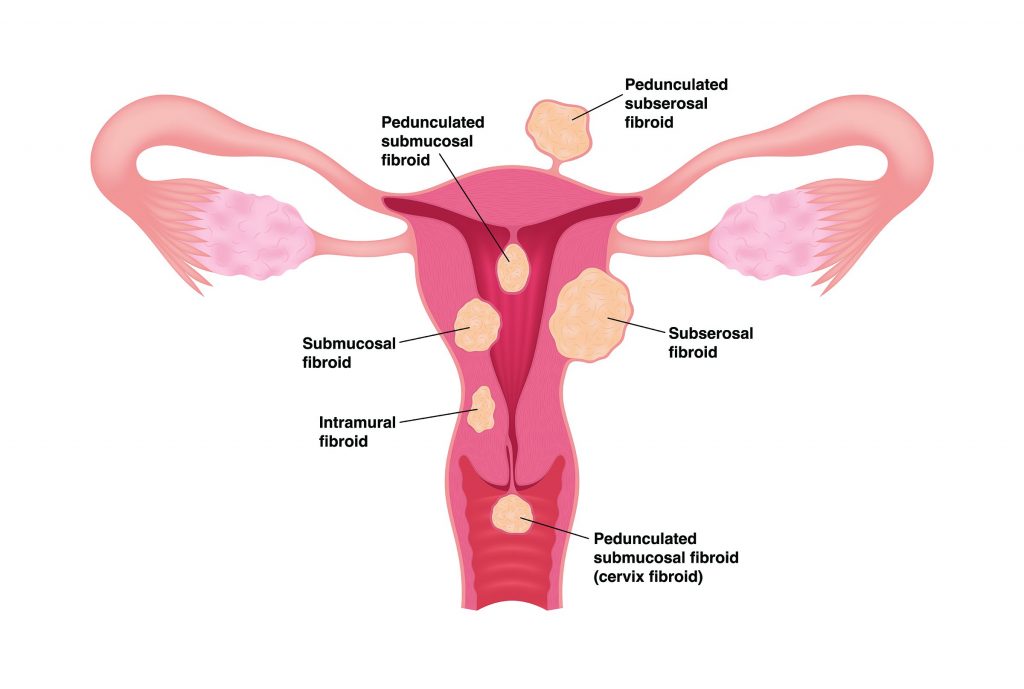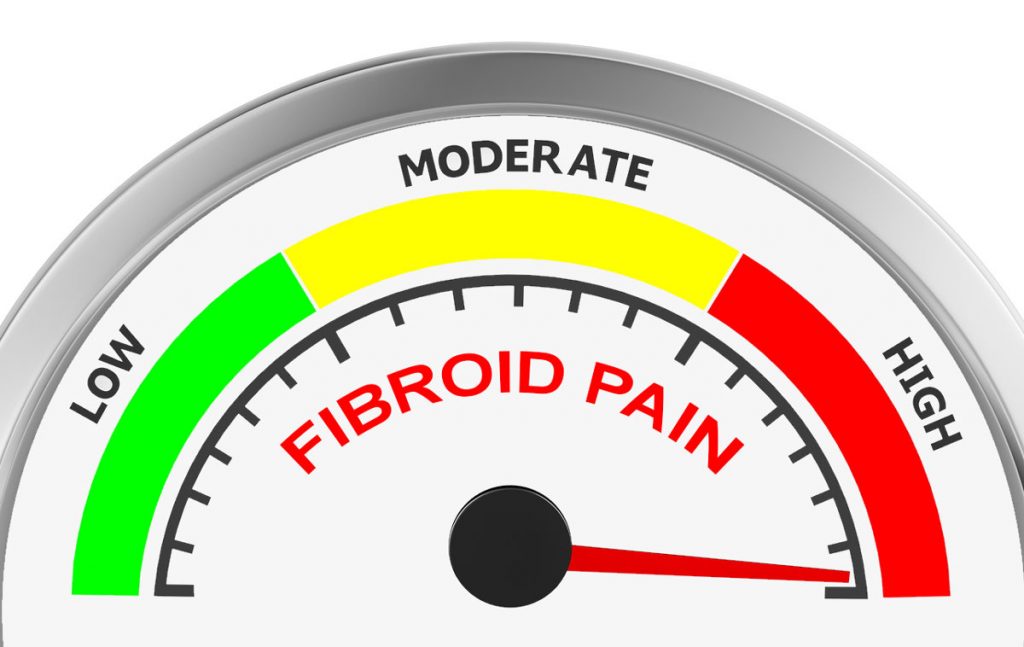Fibroids are benign or non-cancerous tumors that develop from the uterus’ muscle tissue. So many women develop fibroids in their lifetime. Maybe not by the same age or under the same circumstances, but it is common. The problem is that while uterine fibroids have telltale symptoms, many women aren’t in pain at all. Others who have pain aren’t sure if what they are experiencing is related to fibroids. Some signs can be confused with another ailment or not show up right away. As a result, women wonder “what does fibroid pain feel like?”
Do Any of these Uterine Fibroid Symptoms Sound Familiar?
- Heavy or inconsistent menstrual bleeding
- Pain or pressure in the pelvic area
- Pain during or after sexual intercourse
- Frequent or difficult urination
- Weight gain
- Bloating or swelling in the lower abdomen
- Periods that last longer than a week
- Constipation, diarrhea, and rectum discomfort
- Back or leg pain

So, what does fibroid pain feel like? In two words: not good.
Some women have likened it to feeling like their appendix has burst or a painful period that simply won’t end. This discomfort can make it difficult to sleep. It may cause you to wake up suddenly at night. Furthermore, it can feel worse the more fibroids you have. Women may have several fibroids on different parts of the uterus, all growing at different rates and causing different issues. This can include affecting their chances of getting pregnant.
If any or all of those fibroids get too large—as small as a pea to as large as a small watermelon—the debilitating symptoms can make completing daily activities extremely difficult.
In addition, fibroids are so common that if you have several symptoms like the ones mentioned above, your chances of having them are high. Naturally, such a diagnosis catches women off guard, especially when they’re experiencing less obvious symptoms such as cramps, fatigue, nausea, dizziness, and fever.
They likely chalk these symptoms up to general pain that comes with getting older or feeling sick. But a trip to the gynecologist typically says otherwise: it’s fibroid pain.
Sadly, fibroid pain gets worse and some can lead to more complicated issues if not treated promptly.
Why Are Fibroids So Painful?
Fibroid growth is attributed to hormones, birth control pills, and foods like processed meat, salty foods, and high-fat dairy products. According to the Office on Women’s Health, estrogen and progesterone stimulate the development of the uterine lining during each menstrual cycle in preparation for pregnancy. This causes fibroids to swell.
As for why fibroids are so painful, there are a variety of reasons:
- They’ve outgrown their blood supply — Fibroids have a limited blood supply and exhaust it as they grow. As the fibroid degenerates, it causes many of the painful symptoms above.
- Location — Any fibroid located inside the uterine walls (intramural fibroids) or just underneath the uterine lining (submucosal fibroids) can force abnormal changes to the uterus’ shape, causing pain, pressure, heavy bleeding, and other complications. Fibroids that grow outside the uterus (subserosal fibroids) generally press against the bladder, rectum, and other organs. Fibroids that sit on sciatic nerves can cause back pain, too.
- Weight — Not all fibroids are painful by themselves. It’s their weight, especially as they grow, which forces them to press against internal organs. When this happens, the sheer weight of the fibroid causes pain in these areas.
- Twisting and infection — Some fibroids are literally hanging by a thin thread or stalk inside or outside the uterus. These are called pedunculate fibroids. Moreover, it is very easy for them to twist, cut off their blood supply, and cause painful episodes.

Fibroid Pain Exam Options
Your doctor or gynecologist can spot abnormal changes in your uterus’ shape during a routine pelvic exam. You may even ask them during that visit, “What does fibroid pain feel like?” If you aren’t experiencing any symptoms yet, there are several exams they can do to tell for sure if you have fibroids. Beyond a physical exam, they can do a pelvic ultrasound to take a picture of your uterus. This will help show the size of each fibroid if you have any.
In addition, another imaging technique is an MRI. An MRI shows fibroids that are not visible on ultrasound and the most detail in the size and position of the fibroids. It can also show other potential sources of your symptoms and give the doctor a better idea of which fibroid treatment in Dallas is best.
Eliminating Fibroid Pain for Good
The good news is there are a variety of treatment options for fibroids. They don’t all have to end with a hysterectomy or myomectomy. Those are both invasive surgical procedures that either requires a full or partial removal of the uterus or going in and removing the fibroids without taking out the uterus.
If surgery is not the right fit for you and/or you want to keep your uterus intact, ask your doctor about Uterine Fibroid Embolization (UFE). A UFE is a minimally invasive procedure that cuts off blood flow to all the fibroids, causing them to shrink. UFE is a low risk, minimally-invasive procedure and an alternative to surgery.
Get Answers from Fibroid Institute
Uterine fibroids typically cause a host of life-altering symptoms. However, for women who aren’t experiencing the typical symptoms such as bleeding and pelvic pressure and discomfort, it’s easy for fibroids to sneak through undetected. As a result, it’s important to stay on top of regular physical exams. In addition, do not hesitate to let your doctor know about even the smallest changes to your health and wellness.
However, if you do have fibroids and are experiencing painful fibroid symptoms, please know that at Fibroid Institute, we don’t believe you need to decide between suffering in silence or having a hysterectomy. We are dedicated to treating fibroids using Uterine Fibroid Embolization (UFE), the gold standard in non-surgical fibroid treatment.
Do you have questions about fibroid pain and UFE as an option to relieve those symptoms for good? With multiple locations, our Houston and Dallas fibroid centers help thousands of women avoid fibroid surgery but find relief from their fibroid symptoms. Our fibroid doctors are board-certified interventional radiologists and experts who are passionate about helping women become #FibroidFree.
We want to help you become #FibroidFree. Get started now with Fibroid Institute Dallas at 214-838-6440 or with Fibroid Institute Houston at 713-903-3733 or complete the form below.
Fibroid Institute Texas serves the Dallas and Houston areas including Highland Park, University Park, Park Cities, Garland, Mesquite, Richardson, Dallas, Sherman, Houston, Sugar Land, Katy, Webster, Clear Lake, The Woodlands, Universal City, Spring, Kingwood, Stafford, Conroe, Texas City, Cypress, League City, Bellaire, Addison, Carrollton, Plano, Frisco, McKinney, Allen, Fort Worth, Grand Prairie, HEB, Arlington, Hutchins, Irving, Duncanville, DeSoto, Cedar Hill, Lancaster, Cockrell Hill, and more.
Prior to starting any new treatment or if you have questions regarding a medical condition, always seek the advice of your doctor or other qualified health provider. This information is not a substitute for professional medical advice.

